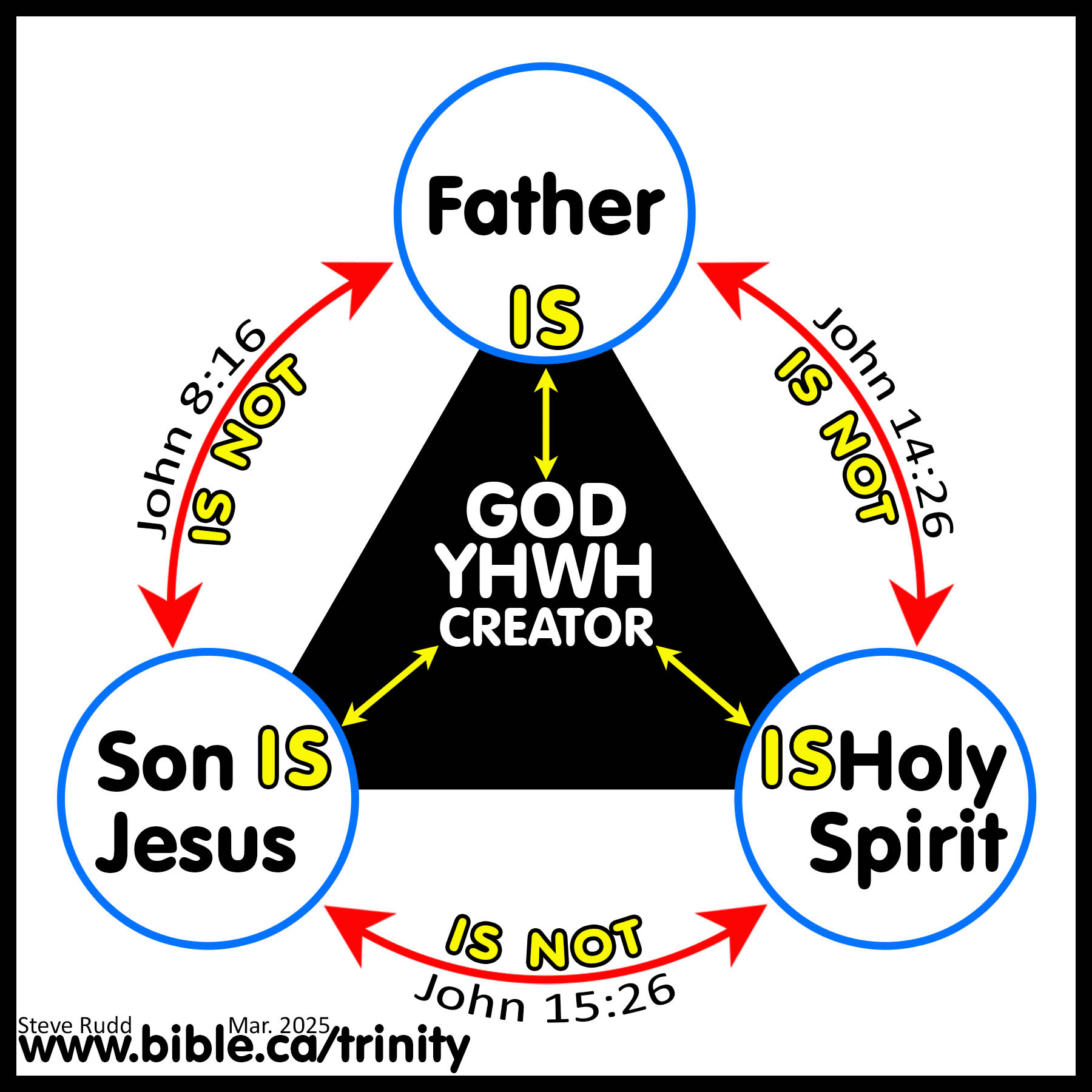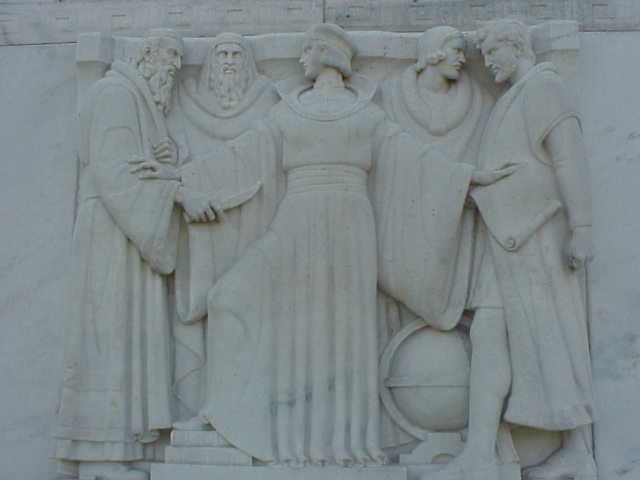Ezekiel’s main messages were about the sin of Israel and Judah, for the Jews to turn away from their sin, and that God would forgive them and redeem their suffering. Sometimes this basic message is lost because of the spectacular visuals of his visions.
A teacher I like, Ken Robinson, tells a joke about this: a girl who doesn’t like most of school is really engaged in an art lesson. When the teacher notices, she comes to ask her what she is drawing. “I’m drawing a picture of God,” the girl says. “But, honey,” replies the teacher, “no one knows what God looks like.” The girl answers, “well they will in a minute.”
1) What are some of the images you have of God the Father, Jesus or of the Holy Spirit?
The Shack is a very popular and controversial book about a man who has a vision of meeting God – all three persons. Some of the controversy comes from his portrayal of the Trinity. Jesus is Jesus, but God the Father appears as “Papa,” a strong, motherly and loving African-American woman. And the Holy Spirit as “Sarayu,” a small Asian woman who is easier to see in your peripheral vision than by looking straight at her. I love the book, but know it is a story and not scripture.
There’s a danger to thinking too much about the images, which is why Jews and Muslims take the first commandment, “You shall not make for yourself an idol, whether in the form of anything that is in heaven above, or that is on the earth beneath, or that is in the water under the earth,” to be strongly against made imagery.
2) What could go wrong with people making images of God? Do you know any idol stories from the bible?
Ezekiel 1:4-28 I looked, and I saw a windstorm coming out of the north—an immense cloud with flashing lightning and surrounded by brilliant light. The center of the fire looked like glowing metal, and in the fire was what looked like four living creatures. In appearance their form was that of a man, but each of them had four faces and four wings. Their legs were straight; their feet were like those of a calf and gleamed like burnished bronze. Under their wings on their four sides they had the hands of a man. All four of them had faces and wings, and their wings touched one another. Each one went straight ahead; they did not turn as they moved.
Their faces looked like this: Each of the four had the face of a man, and on the right side each had the face of a lion, and on the left the face of an ox; each also had the face of an eagle. Such were their faces. Their wings were spread out upward; each had two wings, one touching the wing of another creature on either side, and two wings covering its body. Each one went straight ahead. Wherever the spirit would go, they would go, without turning as they went. The appearance of the living creatures was like burning coals of fire or like torches. Fire moved back and forth among the creatures; it was bright, and lightning flashed out of it. The creatures sped back and forth like flashes of lightning.
As I looked at the living creatures, I saw a wheel on the ground beside each creature with its four faces. This was the appearance and structure of the wheels: They sparkled like chrysolite, and all four looked alike. Each appeared to be made like a wheel intersecting a wheel. As they moved, they would go in any one of the four directions the creatures faced; the wheels did not turn about as the creatures went. Their rims were high and awesome, and all four rims were full of eyes all around.
When the living creatures moved, the wheels beside them moved; and when the living creatures rose from the ground, the wheels also rose. Wherever the spirit would go, they would go, and the wheels would rise along with them, because the spirit of the living creatures was in the wheels. When the creatures moved, they also moved; when the creatures stood still, they also stood still; and when the creatures rose from the ground, the wheels rose along with them, because the spirit of the living creatures was in the wheels.
Spread out above the heads of the living creatures was what looked like an expanse, sparkling like ice, and awesome. Under the expanse their wings were stretched out one toward the other, and each had two wings covering its body. When the creatures moved, I heard the sound of their wings, like the roar of rushing waters, like the voice of the Almighty, like the tumult of an army. When they stood still, they lowered their wings.
Then there came a voice from above the expanse over their heads as they stood with lowered wings. Above the expanse over their heads was what looked like a throne of sapphire, and high above on the throne was a figure like that of a man. I saw that from what appeared to be his waist up he looked like glowing metal, as if full of fire, and that from there down he looked like fire; and brilliant light surrounded him. Like the appearance of a rainbow in the clouds on a rainy day, so was the radiance around him. This was the appearance of the likeness of the glory of the LORD.
Ezekiel sees this same vision in Ch. 8:4 “And there before me was the glory of the God of Israel, as in the vision I had seen in the plain.” And then again in Chapter 10.
Ezekiel 10:9-17 I looked, and I saw beside the cherubim four wheels, one beside each of the cherubim; the wheels sparkled like chrysolite. As for their appearance, the four of them looked alike; each was like a wheel intersecting a wheel. As they moved, they would go in any one of the four directions the cherubim faced; the wheels did not turn about as the cherubim went. The cherubim went in whatever direction the head faced, without turning as they went. Their entire bodies, including their backs, their hands and their wings, were completely full of eyes, as were their four wheels. I heard the wheels being called "the whirling wheels." Each of the cherubim had four faces: One face was that of a cherub, the second the face of a man, the third the face of a lion, and the fourth the face of an eagle. Then the cherubim rose upward. These were the living creatures I had seen by the Kebar River. When the cherubim moved, the wheels beside them moved; and when the cherubim spread their wings to rise from the ground, the wheels did not leave their side. When the cherubim stood still, they also stood still; and when the cherubim rose, they rose with them, because the spirit of the living creatures was in them.
3) Some people feel like God gives visions to communicate, because images are a universal language. So let’s imagine what this might have meant to Ezekiel.
The four faces:
The wings:
The wheel intersecting a wheel:
Full of eyes:
4) Draw a picture of Ezekiel’s vision, or of how you imagine God, or write about an image that could show the glory of God.




